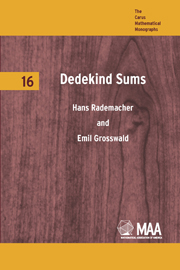Book contents
- Frontmatter
- INTRODUCTION
- PREFACE
- Contents
- CHAPTER 1 INTRODUCTION
- CHAPTER 2 SOME PROOFS OF THE RECIPROCITY FORMULA
- CHAPTER 3 ARITHMETIC PROPERTIES OF THE DEDEKIND SUMS
- CHAPTER 4 DEDEKIND SUMS AND MODULAR TRANSFORMATIONS
- 5 GENERALIZATIONS
- 6 SOME REMARKS ON THE HISTORY OF THE DEDEKIND SUMS
- APPENDIX
- REFERENCES
- LIST OF THEOREMS AND LEMMAS
- NAME INDEX
- SUBJECT INDEX
6 - SOME REMARKS ON THE HISTORY OF THE DEDEKIND SUMS
- Frontmatter
- INTRODUCTION
- PREFACE
- Contents
- CHAPTER 1 INTRODUCTION
- CHAPTER 2 SOME PROOFS OF THE RECIPROCITY FORMULA
- CHAPTER 3 ARITHMETIC PROPERTIES OF THE DEDEKIND SUMS
- CHAPTER 4 DEDEKIND SUMS AND MODULAR TRANSFORMATIONS
- 5 GENERALIZATIONS
- 6 SOME REMARKS ON THE HISTORY OF THE DEDEKIND SUMS
- APPENDIX
- REFERENCES
- LIST OF THEOREMS AND LEMMAS
- NAME INDEX
- SUBJECT INDEX
Summary
Bernhard Riemann died on July 20, 1866 at the age of forty. According to his wish, his manuscripts, notes, etc., were entrusted to R. Dedekind. It turned out that this was a rather mixed lot; there were some practically finished papers, then some drafts of varying degrees of completeness, and some that were just fragmentary sketches.
Among the latter were two notes related to the theory of elliptic modular function as presented in Jacobi's Fundamenta Nova. In Jacobi's work, the parameter q satisfies ∣q∣ < 1. while in these notes, Riemann considers the limiting case ∣q∣ < 1. The first note contains 68 formulae and is written in Latin. The second one consists of a single sheet of paper, is written almost illegibly, and contains eight formulae without any text (except for the three qualifiers “gerade” (even), “ungerade” (odd), and “absolut kleinster Rest von x” (residue of least absolute value of x), all in German).
Dedekind felt unable to edit himself all of Riemann's unfinished papers and asked and obtained the cooperation, first of A. Clebsch (in 1872) and, after Clebsch's untimely death, that of H. Weber (in 1874). Riemann's collected papers, including his posthumous work, came out in 1876 with H. Weber as general editor; however, the two notes dealing with Jacobi's elliptic functions were edited by R. Dedekind himself, under the title Fragmente über Grenzfälle der elliptischen Modulfunktionen.
- Type
- Chapter
- Information
- Dedekind Sums , pp. 66 - 80Publisher: Mathematical Association of AmericaPrint publication year: 1972



